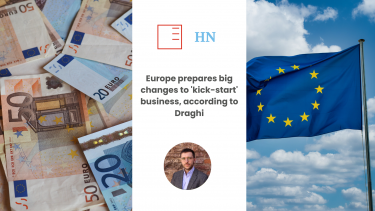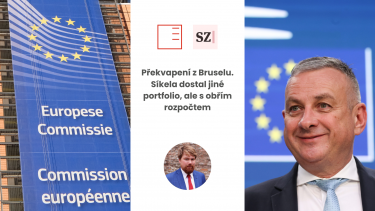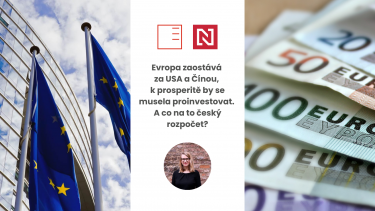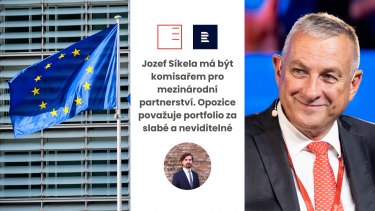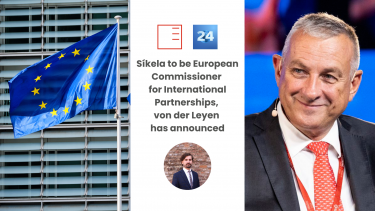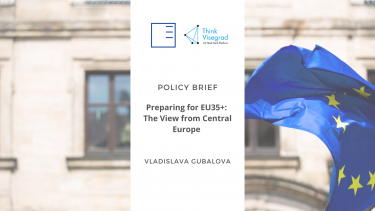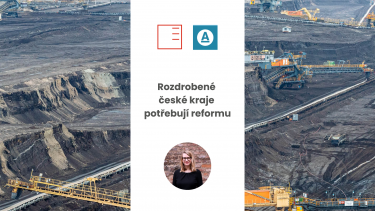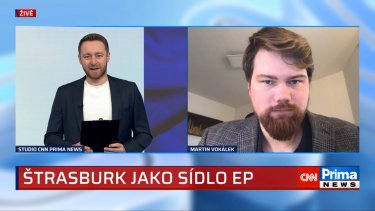Hospodářské noviny | Europe prepares big changes to 'kick-start' business, according to Draghi
In a comprehensive analysis, renowned economist and former Italian Prime Minister Mario Draghi warned EU countries that if their economies continue to grow as they have been, they are in for "slow agony". Well, stagnation. According to the former chief of the European Central Bank, the EU economies will be as large in 2050 as they are today, mainly because the number of people of working age will fall. The only way to reverse this trend is for EU countries to significantly increase their productivity. However, productivity in Europe has grown much more slowly in recent years than in the United States, for example. Filip Křenek, project coordinator and analyst at EUROPEUM Institute, commented for Hospodářské noviny.
Zjistit více
Seznam Zprávy | Surprise from Brussels. Síkela got a different portfolio, but with a huge budget
Jozef Síkela will be in charge of the International Partnerships portfolio within the European Commission. This was announced by the President of the European Commission Ursula von der Leyen. Martin Vokálek, Executive Director of EUROPEUM Institute, commented for Seznam Zprávy.
Zjistit více
Deník N | Europe is lagging behind the US and China, it would have to invest to prosper. What does the Czech budget has to say to that?
In a report to the European Commission, Mario Draghi, former Italian Prime Minister and head of the European Central Bank, warns that without massive investment in green technology, digitalization and defense, Europe will lose its competitiveness. The report was commented by Associate Research Fellow at EUROPEUM Institute Klára Votavová.
Zjistit víceCzech Radio | Jozef Síkela is to be EU Commissioner for International Partnerships. The opposition considers the portfolio weak and invisible
Czech Industry Minister Jozef Síkela is to be the Commissioner for International Partnerships in the new European Commission. EU chief executive Ursula von der Leyen announced this at a press conference in Strasbourg. Political analysts are divided on Síkela's portfolio, they say the government expected more. Viktor Daněk, deputy director of EUROPEUM Institute, commented for Czech Radio.
Zjistit víceČT24 | Síkela to be European Commissioner for International Partnerships, von der Leyen has announced
The President of the European Commission, Ursula von der Leyen, has announced the staff of the new European Commission. Czech Minister of Industry and Trade Minister Jozef Síkela is to be Commissioner for International Partnerships. This portfolio includes the largest ever Directorate-General, which employs three thousand people and has a large financial envelope. Viktor Daněk, deputy director of EUROPEUM Institute, comments for ČT24.
Zjistit vícePolicy Brief | Preparing for EU35+: The View from Central Europe
Despite the historical support of EU enlargement policy by the Visegrad Four (V4), these Central European states are now faced with the challenge of reconciling their stances with the new realities of the process. As Ukraine and Moldova opened their accession negotiations, the EU seems to be torn on the questions associated with the future enlargement(s) - institutional reforms and changes within the EU budget. Transitioning from economic beneficiaries to potential contributors, the V4 states must evaluate the potential political and economic impacts of new members on both the EU and their domestic levels. Writes and proposes recommendations Vladislava Gubalova from GLOBSEC.
Zjistit víceAktuálně.cz | Fragmented Czech Regions Need Reform
In the autumn, regional council elections will be held. The existence of 14 regions in the Czech Republic, however, does not have a long tradition – they were only established in 2000, partly due to the anticipated entry into the European Union. This arrangement is now heavily criticized for their fragmentation, low and duplicative administrative capacities, and the associated negative impacts on the state budget. Klára Votavová, a researcher at EUROPEUM Institute, presents in her commentary on research on the capacities of the state and regions to draw from the Just Transition Fund, using the examples of the Karlovy Vary and Moravian-Silesian regions.
Zjistit víceCNN Prima News | Two plenary session locations of the European Parliament
The MEPs discussed the difficulty of changing the seat of the European Parliament, which periodically moves from Belgium to France. Most agreed that they would welcome if this movement was canceled. However, France would probably veto such a change in the treaties. What are the arguments for and against moving the European Parliament periodically? Is there any way out of this problem, or will Strasbourg's role remain the same for decades to come? Martin Vokálek, Director of EUROPEUM Institute for European Policy, commented for CNN Prima News on the issue.
Zjistit více
ČRo Radiožurnál | Use of Russian assets under the European Peace Facility
The European Commission has proposed how to make use of frozen Russian assets in Europe after the start of the Russian invasion of Ukraine. Up to ninety percent of the assets would be used to buy weapons for Ukraine under the so-called European Peace Facility. The remaining 10% would be transferred to the EU budget and used for the recovery and reconstruction of Ukraine. The proposal still needs to be unanimously approved by EU foreign ministers. Martin Vokálek, Executive Director of EUROPEUM Institute, commented on what this proposal will mean for Ukraine and the European Union for Czech Radio Radiožurnál.
Zjistit více
Euractiv | Strengthening ammunition production through the new European Defence Industrial Strategy
The new European Defence Industrial Strategy primarily responds to the Ukrainian need for ammunition supplies due to Russian invasion. It includes measures such as support for collective procurement of defense systems, focus on the involvement of European firms in public tenders, support for national budgets in transitioning to new weapon systems, and the development of stronger ties with Ukraine and NATO. Zuzana Krulichová, a researcher specializing in European defense policy at EUROPEUM Institute, commented on the funding of the new strategy for Euractiv.
Zjistit více
Staroměstské náměstí 4/1
Praha 1 - Staré Město
110 00
tel.: +420 212 246 552
email: europeum@europeum.org
https://www.europeum.org
